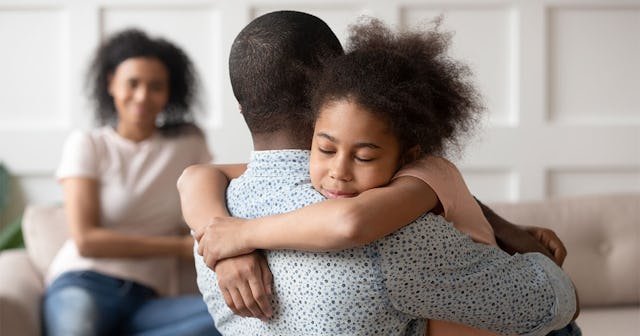The Transition From Mommy To Mom Is Hard, But Daddy To Dad Is Harder For Me

One day I was “mommy.” The next day I was “mom.” The transition happened just like that—with no warning.
Well, almost no warning. My 11-year-old had been holding back from calling me “mommy” in front of her friends for the last few months, but at home, she’d revert to “mommy,” and then seemed almost disappointed in herself. She told me “mommy” sounded baby-ish and she wanted to switch to “mom.” I told her she should call me whatever she’s comfortable calling me.
My 9-year-old was a different story. To him, I was “mommy,” firmly and certainly forever. Or so I thought.
One August day, they came home from camp and within the space of five minutes made the switch to “mom.”
“Mom, can I have water?” from my 11-year-old.
“Mom, do you have any snacks?” from my 9-year-old.
The word sounded—and weeks later—still sounds strange to my ears. They don’t sound like themselves. They sound older when they say “mom.” As if with the switch from “mommy” to “mom” they took a giant step into adolescence. More often than I’d like to admit, I don’t realize they’re calling for me when they yell for “mom.”
And even though I’d talked about the switch from “mommy” to “mom” with my 11-year-old, I wasn’t prepared for how sad I’d feel about no longer being “mommy.” How much I’d miss hearing their little voices say “mommy.”
I suspect the sadness is the kind of sadness moms can never escape. It’s the kind that comes every time our children lose another ounce of innocence, take another step toward living lives that don’t necessarily require us in a hands-on way on a daily basis. I suspect I’ll miss being “mommy” the way I miss carrying a sleeping toddler to bed and playing peek-a-boo to make an infant smile. Already, I wish I had paid attention to the last time they’d said “mommy,” so I could make sure that memory got preserved somewhere safe in the back of my mind. I didn’t. As a result, it’s lost to that place “lasts” are often lost to—the place where the memory of the last time I carried them to bed exists.
At the same time that I became “mom,” my husband became “dad.” That shouldn’t be surprising. “Daddy” is as baby-ish as “mommy,” I suppose. But this change—the first time I heard my daughter say “dad” versus “daddy”—took my breath away.
Because he died three and a half years ago, and when he died, he was daddy. The last time they called for his attention, they called for “daddy.” In the short speech my daughter gave at the funeral, she broke everyone’s heart when she said, “my daddy played basketball with me.” In the I-miss-you letters, birthday cards, and Father’s Day cards that have filled the memory box I keep, he has always been “daddy.”
He will never hear them call him “dad.” They will never get to say “dad” to his face and watch him try to pretend he doesn’t miss being “daddy,” as much as I miss being “mommy.” We will never look over the table and catch each other’s eye and wonder how these two babies—who once upon a time fit in our arms—are now full-fledged tweens rolling their eyes at their “mom” and “dad.”
It’s a reminder that he’s not here—not for this milestone and not for any of the many milestones awaiting both kids in the future.
At the same time that my breath got stolen upon hearing that “daddy” became “dad,” my heart warmed. Because he didn’t stay “daddy” just as I didn’t stay “mommy.” His relationship with them evolved, just as mine did, even though he’s not here. It’s proof that he’s still a part of our lives. Which is something we often say, but what does it really mean? In some ways, saying he’s with us, without more, begins to feel meaningless—words without substance. But this—this is proof that he is in fact still with us. That the words haven’t lost their meaning. In a strange way, that’s comforting. It softens that sting of grief as much as that sting can ever be softened.
It’s endlessly exciting to watch my kids turn into people with big personalities who can make me laugh with their wit and impress me with their intelligence. It’s also bittersweet, because there’s no option to go backward or pause time for just a moment.
All of that is made more bittersweet by the fact that my husband, their daddy-now-dad, isn’t here to experience it with me. But at least I have the proof that he’s here in some way, that he’s coming along for the ride, no matter how many milestones we reach.
This article was originally published on